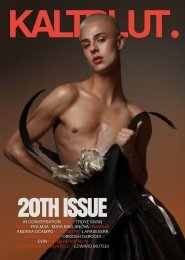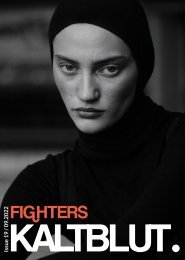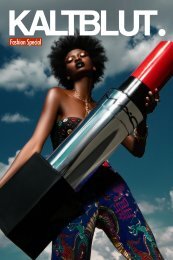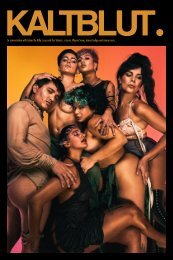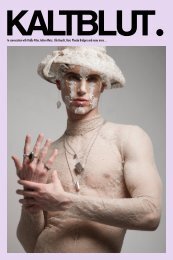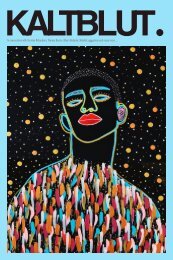KALTBLUT-HONK! 03 The Divas
issue #03. Published 15.05.2011 by Marcel Schlutt & Nina Kharytonova. Art, Fashion, Music and Photography. Artists: Natalia Avelon, Kazaky, Lola Depru, Christian Branscheidt and many more All Copyrights @ The Artists! Berlin 2012 www.kaltblut-magazine.com
issue #03. Published 15.05.2011 by Marcel Schlutt & Nina Kharytonova. Art, Fashion, Music and Photography. Artists: Natalia Avelon, Kazaky, Lola Depru, Christian Branscheidt and many more All Copyrights @ The Artists! Berlin 2012 www.kaltblut-magazine.com
You also want an ePaper? Increase the reach of your titles
YUMPU automatically turns print PDFs into web optimized ePapers that Google loves.
19
– who is extremely demanding when it comes to her
(or his) personal privileges. Or, like on of Senator
John McCain’s advisers put it (complaining to CNN
about Sarah Palin going off-script): divas are people
who we blame to “[…] trust only unto themselves, as
they see themselves as the beginning and end of all
wisdom”. But, based on this analysis, what is someone’s
intention when they call you a diva anyway?
The above-mentioned examples show that the concept
of “diva” somehow seems to be related to cultural
values such as conformity, respectively non-conformity.
One could argue that the more brought into
line the members of a society are, the flashier anyone
who stands out of that conformity will appear compared
to them. On the other hand, the more brought
into line a culture is, the less probable it might be for
anyone to step out of line. In that regard, the Western
world has ever since its early days developed a rather
well-balanced concept between both the individual’s
urge to express itself as well as an ever-present group
pressure that a society’s members are subject to, even
if only on an unconscious level.
The fact that the majority of language users have
chosen to attribute eccentricity or even more negative
connotations towards people that are called
divas leads to the interesting question, why it isn’t,
say, people with an exceptional amount of sympathy
that we refer to as divas instead? As we have seen
above, there is plenty of classical divas still alive
who don’t live up to the reputation of being difficult
characters at all. On the contrary: it seems most of
the (very rare) true genius-like talent in fact enjoy
their lives a lot, and they seem to be far from being
socially difficult people.
How is it then that we still insist on the cliché of a
diva being that arrogant person, who totally thinks
of herself/himself to be a cut above everyone else?
My theory would be that the majority of users of
many languages within the Western world simply
have decided that being a divine talent necessarily
implies being “too much” of an eccentric person
arrogant over ones own perception of reality and
relevance for the continued existence of the cosmos.
I honestly believe that being confronted with





